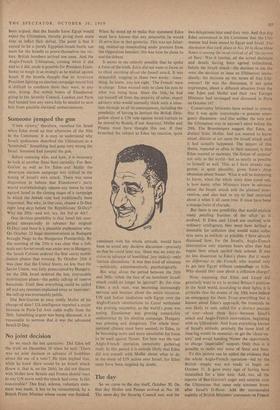No joint decision
So we reach the last questions: Did Eden tell the truth on December 20 when he said, 'There was no joint decision in advance of hostilities about the use of a veto'? He then implied that, while he knew there would be an Israeli attack (knew it, that is, on the 26th), he did not discuss with Mollet how Britain and France should react to any UN move until the attack had come. Is this conceivable? This final, solemn, voluntary state- ment was made, it has to be remembered, by a British Prime Minister whose career was finished. When he stood up to make that statement Eden must have known that any detectable lie would ill serve him in that posterity. This was not falter- ing, twisted-up stonewalling under pressure from the Opposition benches; this was how he chose to end the debate.
It seems to me entirely possible that he spoke a form of the truth. Eden did not want to know or to think anything about the Israeli attack. It was distasteful, nagging in those two weeks : some- thing, he knew, was not right. 'The French' were in charge : Eden wanted only to close his eyes to what was being done. Since the 16th, he had cut himself off from the majority of sober, expert advisers who would normally think such a situa- tion through to all its consequences, including the possibility of having to instruct the British Dele- gation about a UN vote against Israel (certain to be moved by Russia, if not America). Mollet and Pineau must have thought , this out. If they broached the subject to Eden his reaction, quite consistent with his whole attitude, would have been to avoid any decisive discussion—precisely so that he could later say, 'there was no joint de- cision in advance of hostilities' [my italicsj—only 'certain discussions.' It was that kind of situation —politically, administratively, psychologically.
But what about the period between the 26th and 30th—when the fact of an imminent Israeli attack could no longer be ignored? By this time Eden. a sick man, was becoming increasingly nervous and hesitant about the entire situation. UN and Indian mediation with Egypt over the Anglo-French obstructions to Canal settlement was proving successful, as the world's press was noting. Eisenhower was proving remarkably undistracted by his election campaign. Hungary was pressing and dangerous. The whole inter- national climate must have seemed, to Eden, to be becoming more and more unsuitable for force to be used against Nasser. Yet here was the vast Anglo-French operation inexorably gathering itself. In this period it is entirely likely that Eden did not consult with Mollet about what to do in the event of UN action over Israel; for Eden must have been impaled by doubt.










































 Previous page
Previous page